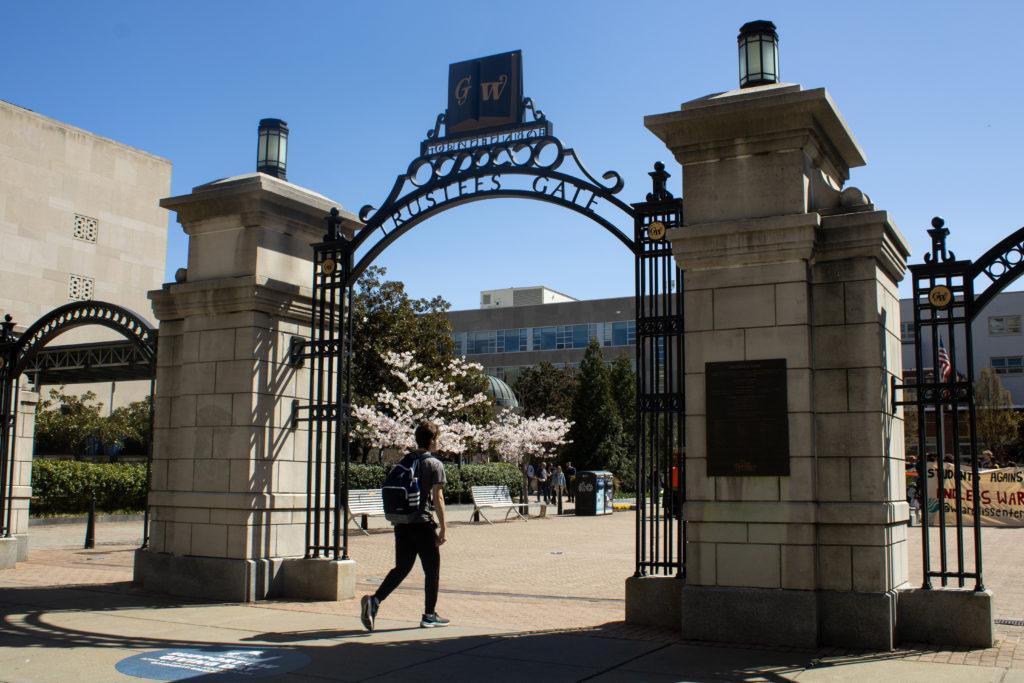Officials released recommendations for monitoring students’ academic success amid a national drop in performance, a move faculty say will support students adjusting to college.
The recommendations, which officials from each of GW’s schools sent faculty via email at the beginning of August, include faculty feedback forms submitted in the third week of the semester, proctored ALEKS math placement tests to ensure students are placed in the right class and more targeted support for students. Officials developed the tactics to combat slipping literacy and math comprehension skills among K-12 students as a result of lower national online learning retention rates during the pandemic and higher rates of mental illness through access to support resources.
In February, Provost Chris Bracey formed the Student Success and Retention Task Force to identify how to academically support students readjusting to university learning environments post-pandemic and developed the list of recommended strategies. Bracey formed the task force after the Education Policy and Technology Committee, a Faculty Senate standing committee, began asking the Office of Student Success, the College of Professional Studies and Disability Support Services if they noticed the effects of declining comprehension skills in K-12 education on college performance last fall.
Nine faculty said they are adjusting their teaching strategies and implementing the task force’s recommendations into their courses to help students struggling to adjust to college due to pandemic-related academic performance drops and social stressors resulting from the transition back to in-person learning.
Irene Foster — the EPT co-chair, director of inclusive excellence for the economics department and an economics professor — said the recommendations target first-year students because post-pandemic national data shows many are struggling to adjust to college academically, socially and mentally after COVID-19. Foster said when GW returned to in-person learning in fall 2021, she noticed more students in her first-year economics class struggling to keep up with the content and experiencing heightened levels of stress and anxiety.
“I had a higher number of students in DSS, more students having anxiety attacks during exams,” Foster said. “I had never seen that before, and so just my own experience told me that something was different.”
Foster said earlier faculty feedback forms — which professors previously filled out closer to the midsemester mark and help to identify and monitor specific students struggling in class — and low-stakes assessments allow professors to identify students who are struggling early in the semester. She said the new form is more work for professors upfront but allows faculty to provide support resources and targeted attention to students before the midsemester point, when it’s often “already too late” to help a student who is behind.
The OSS reviews the faculty feedback forms and works to connect students identified as struggling with advisors, mentors, the Academic Commons and other resource offices.
“For faculty it’s more work, I mean I have a huge class, it’s almost 500 students, so just putting in the faculty feedback will take me a couple of hours,” Foster said. “But, on the other hand, the trade-off is that you could help so many students.”
Foster said EPT formed a subcommittee on student success and retention in August to continue asking faculty where students need more attention, monitor retention rates and make any additions or adjustments to the recommendations with the information they receive.
Foster said the economics department implemented proctored ALEKS placement tests — an online test that STEM departments mandate students take in order to place them in appropriate starting course — because faculty noticed students performing worse on proctored exams compared to unsupervised tests with similar content.
Daniel Mackay, an associate professor of economics, said the OSS is working with him to help keep track of students who are falling behind in his Principles of Economics I class. He said he plans to submit a list of students who need extra support to the office Monday.
Mackay said many students aren’t yet eligible for his class because they are taking the prerequisite course due to a low ALEKS placement score, which could be due to students forgetting math learned during remote learning in high school.
“Students really struggle a lot more,” Mackay said. “The retention for that experience seems to have been terribly low.”
Tamara Henry, an associate professor in the Milken Institute School of Public Health, said she didn’t feel she had enough time to implement the recommendations given she didn’t receive them until August. She said the timeline for submitting faculty feedback is also “a little short” given that students are still moving around their schedules and would like to see it extended to closer to the midsemester mark.
“I’m gonna try and put forth the greatest effort to complete it,” Henry said. “Will I be able to do it for all five classes? I don’t know if that’s gonna happen.”
Henry said the recommendations did not include guidance from officials on how to implement the recommendations, which would be “well appreciated” because she does not know how to efficiently complete the feedback forms given the large number of students she sees.
Daniel Sude, a visiting assistant professor of organizational sciences and communication who teaches the “Imagining Better Social Media” first-year dean’s seminar, said while these recommendations weren’t “revolutionary” because the University consistently looks to improve student success and retention by bolstering support resources, they make “clear” strategies faculty should use to help students coming in having retained varying levels of information from virtual classes.
“In the post-pandemic world, students are now more of a question mark, and I think these resources remind faculty members not to assume that they know what learning their students were able to do or not to do, what experiences they had or didn’t have, we can’t assume that anymore,” Sude said.
Forrest Maltzman, a professor of political science and the former provost, said the recommendations aim to make sure students “know where to go” to receive the support they need. He said the University provides students with resources like the University Writing Center and feedback mechanisms to help connect students to support systems.
“The real goal is to make sure that our students are taking advantage of the resources that we have to sort of help them stay on track and be successful,” Maltzman said.
Laura Papish, an associate professor of philosophy, teaches the “evil” first-year seminar and said she already implemented changes to her attendance and participation policies prior to any guidance from the University after noticing freshmen experiencing higher levels of academic and social stress when returning to in-person classes.
“In particular freshmen, I definitely see differences in the stress level all around, people are still pretty stressed out,” Papish said.








